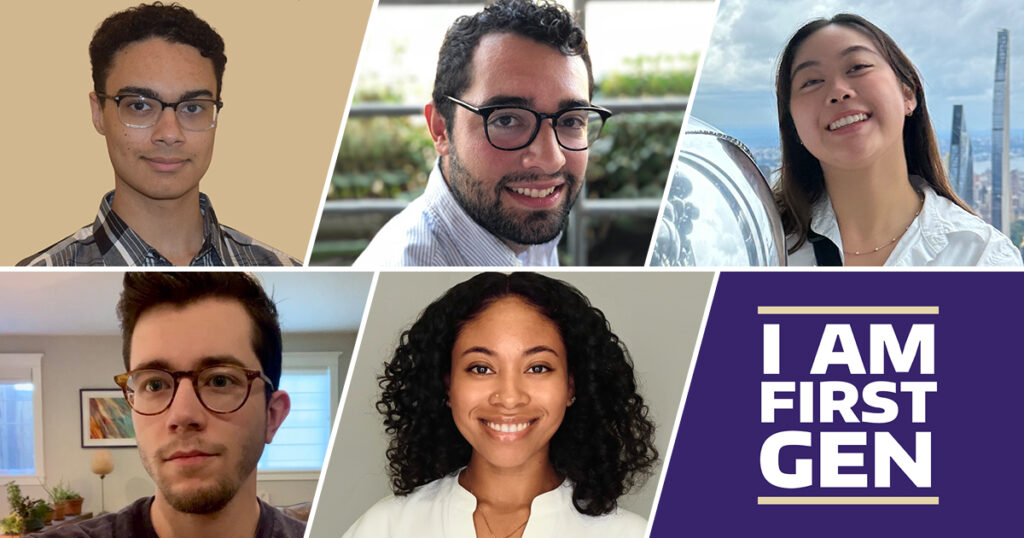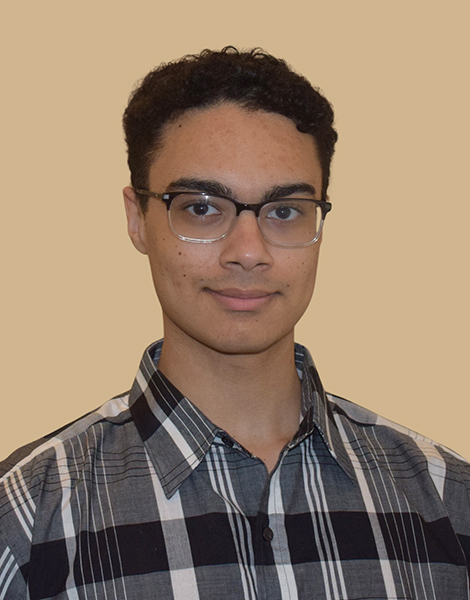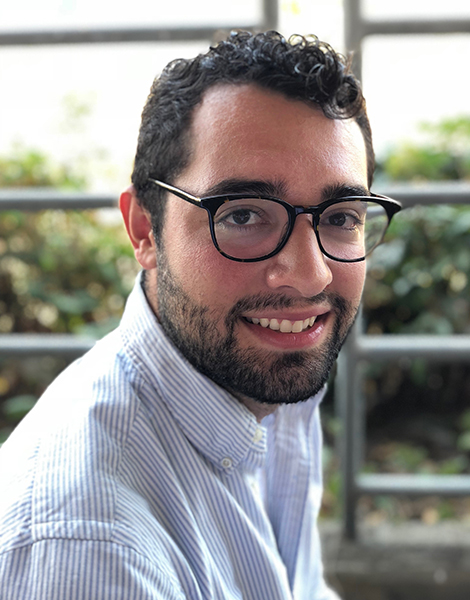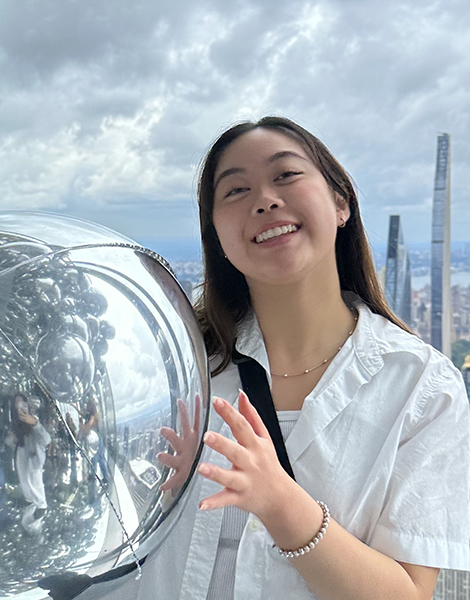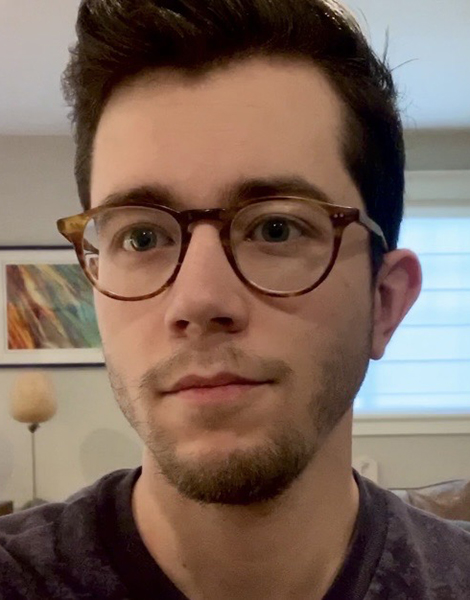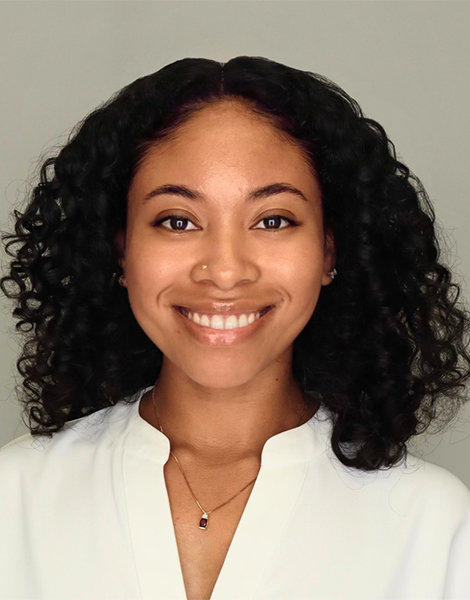It can feel lonely being the first in your family to pursue a four-year degree.
How do you apply? How will you pay for it? What major should you choose? How will you navigate your new surroundings, not to mention make new friends? If you run into difficulty, where do you turn for help?
And what are “office hours,” anyway?
Nearly one-third of the more than 43,000 undergraduates enrolled at the University of Washington are first-generation. So while it may seem lonely at times, they are not alone. To remind them of this fact — and to remind everyone at UW of the many ways in which first-gen students enrich our campus community — each year on November 8th the University participates in the National First-Generation College Celebration. To highlight the Allen School’s diverse first-gen community, we asked students to share what it means to them to “be the first” and any wisdom they have for those who have yet to embark on their first-gen journey.
Zander Brumbaugh: Turning a hobby into an opportunity for connection and empowerment
While Zander Brumbaugh knew from a young age that he wanted to be a scientist, he didn’t know he wanted to be a computer scientist. Growing up in Tumwater, Washington, Brumbaugh turned his fascination with the inner workings of various systems into a hobby making video games in high school and, eventually, the beginnings of a career in computing. Currently pursuing his master’s degree in the Allen School’s combined B.S./M.S. program, Brumbaugh has refined his career goals to focus on artificial intelligence research — an “immensely important field” in which he hopes to make a positive impact. To start, he is writing a book on how to adapt and use language models effectively for specific needs as a way of promoting public literacy around these rapidly emerging technologies.
What does it mean to you and/or your family to be the first to pursue a bachelor’s degree?
My family has always been very supportive of the work that I do and my decision to pursue higher education. Both of my parents were unable to attend college due to financial limitations. Because of the scholarships I received, I was able to overcome this and be the first in my family to earn a degree, for which I am eternally grateful. In short, my degree is a source of empowerment; it gives me the ability to create new opportunities for myself and to connect with like-minded individuals who share similar goals.
What has been the most challenging aspect of being a first-gen student?
College is quite different from high school or anything else most students are likely to have encountered in their early academic careers. Finding the groove in my first few quarters wasn’t easy, especially with the start of the COVID-19 pandemic less than halfway into my first year. I made a group of close friends who came from many different backgrounds, and I found my experience improved greatly. Being a first-gen student, I didn’t have anyone at first to help me navigate student life, but we ultimately found our way through it together.
And the most rewarding?
By far the most rewarding part is simply being able to call home and tell my parents what I’ve been up to. Both of my parents are retired and enjoy hearing the details of my classes, activities with friends, and my research — though they say most of it goes over their heads! My father is my biggest promoter; oftentimes I’ll receive messages online from people who work as cashiers at stores or waitstaff at restaurants whom he’s cheerfully told about my books and games. My parents’ pride inspires me to be the best version of myself — and also thankful for the opportunities I’ve been given, knowing it’s something they didn’t have.
What motivated you to continue on and get your master’s?
As it was always my goal to become a researcher, I began looking for undergraduate research opportunities during my sophomore year. I first worked in AI for vision and language for creative applications and eventually found intersections with robotics that greatly interested me. I joined the ARK lab led by professor Noah Smith during my senior year and started my journey with natural language processing (NLP) research. Wanting to continue my research and eventually pursue a Ph.D. in the future, I applied to the B.S./M.S. program and was accepted. So far, the experience has been everything I imagined; the program provides an environment where I’m immersed in intriguing research, exchanging ideas with others both in and outside of my field and developing projects across various topics.
What advice would you give to other first-gen students?
Heading off for college is an exciting time, full of new experiences. Even if you have family or friends who went to college, it can be difficult to find advice on how exactly you should be approaching different problems — and if you don’t, it can be even more so. While everyone’s experience may be different, finding even a small, close group of friends can help to make a support system. You can help each other navigate your classes, work, or simply your social lives. I would encourage you to check out a club meeting, be outgoing whenever you can, and try to look for others with whom you might share something in common (or not!). There are also mentorship programs offered by multiple groups affiliated with the Allen School that may be helpful in getting you started.
Daniel Campos Zamora: Making a career out of making change and helping people at scale
Daniel Campos Zamora followed what he calls a “long and winding road” to computer science that extends back to his birthplace of Costa Rica. Growing up in New Jersey, Campos Zamora had always been interested in making interesting things; he just never considered making a career out of it. That changed after he began an interdisciplinary degree in psychology and art at Carnegie Mellon University. There, he discovered programming tools like Arduino and Processing that made him realize how powerful computing could be as a medium for change. After earning his bachelor’s, Campos Zamora worked for a professor of human-computer interaction, and later, for Disney Research; that combination of experiences caused him to realize that he wanted to do HCI research himself. The road eventually led him to pursue a Ph.D. in the Allen School’s Makeability Lab working professor Jon Froehlich — and to tap into his first-gen experience in his roles as a reviewer for the school’s Pre-Application Mentorship Service (PAMS) and faculty recruiting.
What does it mean to you and/or your family to be the first to pursue a bachelor’s degree?
I was raised by a single mom who immigrated to the U.S. because she had high hopes for us to get an education and get ahead. She always instilled in me and my siblings that she wanted us to go to college, but she didn’t really understand what that entailed. College didn’t really feel real to us; no one in our family had gone to college, and we didn’t know a lot of people in this country who had college degrees. My mom maybe took one class back in Costa Rica before she had to drop out to have my brother. So it meant the world to her that her three kids were able to get degrees. After graduating, I framed my diploma and gave it to her as a Christmas gift, because I knew how much it meant to her. And if you don’t know, the CMU diploma is gigantic!
What was the most challenging aspect of being a first-gen student?
I think the whole experience of college is really different when you’re first generation. I was the only one of us to move away for college and be away from family and live in the dorms. When you do that, you don’t have a support system, and you don’t know what kind of support is available at school. You don’t know about office hours; you may know they exist, but you don’t know what they actually mean, and you don’t know what any of the offices on campus mean or do. You don’t know what you don’t know yet — you’re dealing with “unknown unknowns.” I struggled because I didn’t identify with a lot of people at my institution, and it was really hard finding support.
How did you navigate those “unknown unknowns”?
I went back to what I knew: I can just work on the classes and do my best. I think I stumbled through some of the other parts, like eating, taking care of yourself, your mental health. You don’t realize, when you’re away from your family, it requires extra work to do that. The saving grace for me was that I met someone on my floor who has a similar background but who knew the school better after doing a summer program there. Through him I got involved in a minority organization and found a support system. And they led me to the campus resource center that assists minoritized students, including first-gen and low income. Through their counselors, I got a lot of support — but it took two years before I even knew that office was there.
What was the most rewarding aspect of being a first-gen student?
I feel like I’m in a much better place to help younger family members thinking about college to understand what it actually means to go down this path. I can take them to look at colleges and help them understand the processes and that there is so much more to the college experience than just getting good grades.
For me personally, what was most rewarding was being exposed to really talented people and really exciting ideas, and to be able to take advantage of resources once I knew they were available. I think it opened up a lot of doors for me, and I would not be at the Allen School if it was not for that experience at CMU. Also, the friends and connections that I made there — I know I have those relationships for a lifetime.
What advice would you give to aspiring first-gen students?
Advocate for yourself, but also be able to admit that you don’t know stuff. I feel that when you get to college, the imposter syndrome — that feeling like, “I don’t belong here” — is so aggravated because you are the first one. So I think it’s knowing that you do belong, but you might need help. Also, usually people who make it to these schools have done well academically, and they might not have struggled too much up until that point. And because so much importance is placed on going to college and getting good grades, when you do run into roadblocks, it’s so disorienting and discouraging.
It takes a lot of courage to acknowledge that you’re struggling and to ask for help. I think that’s very tough for first-gen students who may not even know that they are struggling. I wish someone had told me that it’s okay to ask for help. I’ve had to ask for help here doing my Ph.D. — I’m the first in my family to go to grad school, so that’s a totally new thing. The more you ask for help, and the earlier you do that, the better off you’ll be.
Ha Vi Duong: Choosing her own path while embracing the power of creative problem solving
As a high school student in Moses Lake, Washington, Ha Vi Duong envisioned a career in medicine. While she soon realized that she wanted to do something else with the rest of her life, she wasn’t sure what that something was. A conversation with an advisor — and an encounter with programming through Girls Who Code — helped her see how computer science would allow her to exercise her creativity while solving real-world problems. Duong entered the Allen School as part of the 2021-22 cohort of Allen Scholars. She later took on the role of chair of GEN1, a student group dedicated to empowering and guiding first-gen students, and joined the Vietnamese Student Association’s VSAUW Dance Team. Throughout her time at UW, she has been determined to work hard not just for her own future, but also for that of her parents — in appreciation for the sacrifices they’ve made.
What does it mean to you and your family to be among the first to pursue a bachelor’s degree?
My parents always emphasized the importance of education and believed it should be a top priority in life. I remember them sharing stories about their own experiences when they had to help provide for their families instead of continuing their education. For them, education didn’t always come first. They made the selfless decision to come to America in search of a better life, especially for their children. They’ve worked tirelessly to make this happen, running a restaurant that demands long hours and hard work.
One summer, I got a firsthand look at what they go through when I helped out at their restaurant. It was an eye-opener, and I gained a deep appreciation for what my parents do every day. When I talked to them about how tough it is, they told me something that has stuck with me ever since: “You should work hard to not have a job like ours. We didn’t know what else to do.” It made me realize how lucky I am. I have the chance to pursue higher education, to explore many career options, and choose my own path. This awareness has made me incredibly grateful.
What has been the most challenging aspect of being a first-gen student at the Allen School?
The most challenging aspect has been dealing with imposter syndrome. The rigorous coursework often makes it feel as though I’m behind compared to my peers. To this day, I still can’t believe that I am able to be where I am. However, amidst this struggle, I’ve discovered a valuable support system within the Allen School community and an understanding that we are all on our own paths and are here for a reason, which has been key in overcoming these challenges.
What about the most rewarding?
The most rewarding part of my experience has been the sense of accomplishment that comes from successfully completing those demanding courses. It’s immensely satisfying to see the progress I’ve made and to be able to connect the material learned in one class to another and eventually apply this knowledge in the real world. This interconnectedness between academic learning and practical application makes the educational journey at the Allen School both challenging and deeply fulfilling.
Any advice for other first-gen students at UW?
For first-gen students, it’s essential to remember that UW offers fantastic programs and a wide range of groups and organizations. While it may initially feel overwhelming, it’s all about the effort you put into discovering resources and building connections to support you in your college journey. Don’t hesitate to step out of your comfort zone and make connections; you never know where it might lead! It’s normal to feel a bit lost, but remember that everyone has their unique path and pace.
What are you hoping to do after graduation?
I’m currently in the process of exploring my post-graduation options, and I believe that finding a career where I can witness the tangible impact of my work is crucial. While I don’t have a specific plan in place just yet, I’m actively seeking opportunities that align with my interests and values. My goal is to pursue a path that allows me to make a meaningful difference in the world and see the results of my efforts come to life.
Derrik Petrin: Rediscovering his love of computing by leaving the lab and entering the arena
Derrik Petrin went all the way to Yale University to earn a bachelor’s degree in biochemistry before he realized that he did not, in fact, enjoy working in a lab. As a middle-school student in Issaquah, Washington, he had taken a programming class and liked it; he also liked the original Magic the Gathering card game by Wizards of the Coast. After he returned to this coast, Petrin eventually parlayed both into a position with the company as a software development engineer after spending some time as a freelance software consultant. Lately, Petrin has been working on the team that produces the digitized version of the game, Magic the Gathering Arena. When he’s not getting paid to play during work hours, he’s advancing his own story arc by pursuing a graduate degree in computer science through the Allen School’s flexible Professional Master’s Program (PMP) — which offered Petrin not only the opportunity to obtain a computer science degree but also to explore what his next chapter might be. He also has connected with his roots through his involvement in the local Hungarian-American Association.
What did it mean to you and/or your family to be among the first to pursue a bachelor’s degree?
It’s funny — I didn’t really start thinking of myself as first-generation until near the end of undergrad. I went to school on the Eastside, on the plateau, and didn’t really appreciate the differences. Some of my aunts and uncles went to college, but my dad’s parents didn’t, my dad didn’t, my mom emigrated from Hungary. So it didn’t really start dawning on me until I was in undergrad, when I realized that all of my classmates’ parents were professionals — lawyers, doctors, engineers and mathematicians — and mine weren’t. I started noticing how my parents didn’t have any advice they could give me. I always thought I would get a degree; I think my parents always expected that, too. So it was hard to imagine me not doing that.
What was the most challenging aspect of being a first-gen student?
My parents are not academically inclined. By late middle school and high school, I felt really comfortable in an academic setting and was used to planning and deciding everything myself. One of the reasons I ended up going to Yale was that it had the most generous financial aid package. I remember in my senior year seeing a statistic about the percentage of students who received no financial aid at all — and that’s a pretty high income cut-off — and it was a large number of students. And then I noticed that a lot of the classmates that I had formed close friendships with were also on some form of financial aid. So it dawned on me that this stuff tends to organically group us together without us realizing it.
I also had some pretty severe mental health struggles. Yale has had some publicity in recent years about their poor handling of student mental health. So it was not the easiest environment to not have parental support, but also I did not realize that that’s something that was making things more difficult. It was pretty overwhelming.
How has that experience shaped your career path since?
If I had not been first-generation, it’s more likely I would have continued straight into applying to Ph.D. programs. But also after college, I probably would have taken a less winding path than I have taken. And there are some benefits and disadvantages to that. One of the benefits is, when I ended up doing freelance consulting for a while, I dropped out of being in a cohort after spending most of my life in a cohort in an institutional setting. And I got used to being okay with doing things that are not necessarily the typical way to do them. For example, even though the PMP is typically an evening program, during one quarter the programming languages course was taught in parallel with the “normal” morning one. I had the flexibility to take that morning class instead and spend time with the Ph.D. students. One of the professors then invited me to spend time in the Programming Languages & Software Engineering (PLSE) lab, so I again got to interact with Ph.D. students there. It’s put me into a mentality where I think less in terms of a structured path.
That flexibility is useful, but sometimes it would be nice to have more structure. Another challenge is that if you don’t have this very clear box to show to people, they’re not sure what to make of you. So, for instance, maybe you’re interested in doing research — but people aren’t sure even logistically how that would work. The PMP is not a research program; but at the same time, it’s this great, very broad survey program. So as I’m taking courses in these different areas, I’m thinking about which one sparks the most interest. But one area where the first-gen experience comes in is, I don’t know how to take that and follow through to make an ongoing connection. A lot of students do PMP for professional development, and that’s what it is primarily set up for, but there are also students, like me, who have that intellectual itch and this is the most accessible foot back in the door.
What advice would you give to other first-gen college students?
Something that I think is good advice for undergrads in general is to go to office hours, which as an undergrad, I did not do. Coming back to school and paying for the classes myself — and being really excited about them — face to face time with the professors is so important. Go to office hours even if you are behind on the assignment, or don’t have questions about the assignment, just to listen to what other students are asking. Even if you don’t have anything prepared, some conversation will happen. That has been really helpful for me coming back to the PMP.
Some people who are first-gen students are very aware of it; it’s part of their identity right from the get-go. But for others, like me, we don’t realize right away how much being first-gen impacts our experience. So keep in mind that you are carrying a lot more weight than other students are. If it seems harder, if it seems things are not coming as easily to you, that’s not surprising. It’s also not your fault, so practice self-compassion.
Nicole Sullivan: Advancing science and sustainability while assisting others in their journey
Nicole Sullivan first began to consider a career in computing-related research as a high school student in Cerritos, California. After enrolling in a computer science course in the 11th grade, she became fascinated with the field’s potential to address environmental challenges such as nature conservation, climate change, agriculture and more. She found further inspiration as a Karsh STEM Scholar and undergraduate researcher at Howard University, an experience she credits with setting her on the path to earning a Ph.D. She followed that path across the country to the UW, where Sullivan is making meaningful contributions to data science and sustainability working alongside professor Magdalena Balazinska in the Allen School’s Ph.D. program. She is also helping to inspire a new generation of researchers by mentoring underrepresented minority students hoping to follow in her footsteps.
What did it mean to you and/or your family to be the first to pursue a bachelor’s degree?
I’m grateful for the opportunity to pursue higher education, which my parents fully support. They were proud of my independence during my undergraduate studies and are ecstatic about my pursuit of a Ph.D.
What was the most challenging aspect of being a first-gen student, and what was the most rewarding?
While it was overwhelming and challenging to figure out scholarship and college applications on my own, I’ve gained a solid understanding of the process. That has equipped me with valuable insights that enable me to assist others in their journey.
How have you applied your experience to assist others?
I am currently a graduate mentor for A Vision for Electronic Literacy and Access (AVELA). Before that, while I was at Howard University, I was a National Society of Black Engineers (NSBE) Jr. Mentor and a Microsoft Code Academy (MCA) Lead Learner. As an AVELA mentor, I create and teach original STEM content for Black, Brown, and Indigenous middle and high school students throughout greater Seattle. In NSBE Jr., I supported two teams on their way to the NSBE national robotics competition. Additionally, through MCA, I spent every other weekend teaching programming fundamentals to Black students in kindergarten through 5th grade.
What advice would you give to aspiring first-gen college students?
I highly recommend participating in programs like AVELA and NSBE. Engaging with AVELA, which offers free courses in coding basics, machine learning, hardware, and more, can provide an excellent foundation in various areas of study. Not only will you acquire valuable knowledge, but you’ll also have compelling experiences to highlight in your college application essays and add to your resumes. Furthermore, NSBE extends scholarships to high school students and organizes an annual conference where you might discover field-related opportunities and gain hands-on experience during your high school years. While the NSBE conference isn’t free, consider contacting your high school counselor or local NSBE chapter to explore potential funding options.
What do you hope to do after earning your Ph.D. from the Allen School?
Although I’m not exactly sure what will happen after I graduate, I know I will choose a path either in academia or in industry research. And I intend to continue mentoring underrepresented minority students to foster their enthusiasm for STEM Ph.D. programs and higher education in general.
Learn more about the First Generation College Celebration at UW here.


